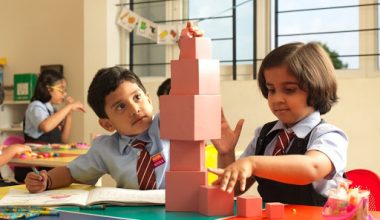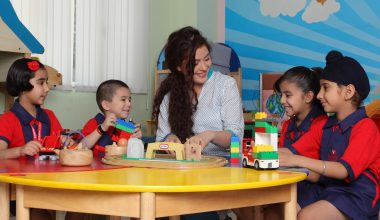Happy, healthy, and successful!
We beam with a smile while hearing such words, how beautiful will it be when kids are raised this way!
Looks like they would learn all the tools in their childhood; tools to face life and convert every challenge into an opportunity. Giving kids a happy, healthy childhood sets them up for success in life.
“A connected childhood is the key to happiness,” says Edward Hallowell, M.D., child psychiatrist. “Connectedness”- is a feeling of being loved, understood, wanted, acknowledged. It is emerged as by far the biggest protector against emotional distress and risky behaviours including smoking, drinking, and using drugs.
Here are some ways to build an environment conducive for it:
- Be happy with yourself: Everyone is responsible for their own happiness and we aren’t responsible for our kid’s happiness too! Kids absorb from us. As parents, we need to be happy with ourselves. Our moods matter. Happy parents have happy kids. Their happiness often naturally flows
- Consciously praise: Praise their effort, hard work, lessons learnt on achieving the goal, their resilience than the result. Instigate a growth mindset. We don’t say that you shouldn’t appreciate your kids. Just be conscious about it. Kids will get used to winning rather than sensing failures / tough situations. If you praise your child and call him/her a mini-Michael Jackson, it will backfire. If he falls short the next time, he will be afraid to face you, develop self-doubts, inferiority complex, seek validation from others etc.
- Limit the screen time: Experts say that kids who spend less screen time were happier. Too much screen time is not good for their psychological well-being. Happiness and experiences gained from outdoor play, playing with their friend is humongous when compared to ones from the virtual world of mobile phones.
- Exercise self-control and empower them to : For the sake of momentary pleasure, kids tend to go to play leaving their homework behind, watch web series in another tab when an online class is going on, binge watch and eat. Set some basic rules and practice with them too, not just preach.
What can parents do?
- Put a basket in the kitchen for smartphones. Tell your child to put his/her smartphone in the basket when doing homework.
- Put all electronics in a common area of the home before bedtime. Then, your child won’t be tempted to use her tablet or her phone when she’s in bed.
- Stock the refrigerator and cabinets with healthy food choices. If you keep some sweet treats in the house, make them more difficult to access—by putting them on high shelves or placing them in the back of the pantry out of sight. Reserve them for occasions.
- Teach them about boundaries: Talk to kids about boundaries with age-appropriate terms. Encourage them to talk about their emotions without any shame.
Learning these skills early will help your kids know what to do in future relationships. Tell them communication plays a crucial role:
- Allow them to experience success and failure: Kids should experience that there exists best of both worlds. Life doesn’t come with a manual. However, as we get on to experience the roller- coaster ride of an adult life, such experiences equip us to handle life and this brings in more peace and happiness.
- Give real responsibilities: Yes! No pretend play with kids when it comes to responsibilities. Ask them if they will help you in the laundry and in the kitchen, as you are getting worked up. Teach them to fold their clothes and keep it in the rack. Then, slowly ask them to fold the clothes of all others in the family and assign them the responsibility of laundry. This creates a sense of belonginess and they in turn learn a life skill in their early years.
- Practice the habit of gratitude – The habit that can foster all kinds of positive emotions. Practising gratitude into our everyday lives could help kids become happier, healthier adults. A 2012 study on gratitude says that grateful people enjoy better relationships—and that can be key to living a happier life. Make it a to-do dinner table conversation/ bedtime conversation. They will eventually learn to look for things they can be grateful for in their daily lives.
All of this put to practice early on can make for happy, healthy and successful children.






